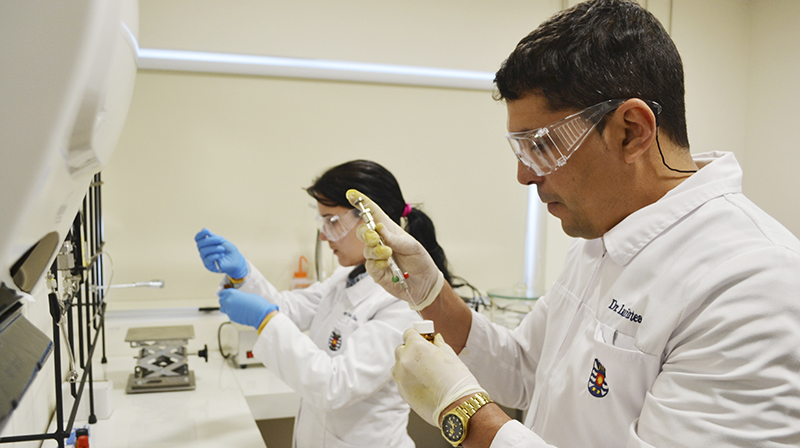Research groups from Chile and Germany collaborate on an international project that seeks to develop new catalysts with applications in the sustainable production of energy from biomass.
The replacement of fossil fuels and their derivatives is a challenge for many countries, including Chile. This change is much more than moving from oil to clean energy, it is moving from an insecure and polluting oil economy to a sustainable bioeconomy as the basis for the development of countries. To achieve this goal, there are several technologies that are already ripe for energy production, such as solar or wind, and there are also some emerging technologies in which research is progressing, such as gasification.
A group of scientists and students from the Technological Development Unit, UDT, the CarboCat group of the Department of Chemical Engineering of the Universidad de Concepción, and the Laboratory of Thermal and Catalytic Processes of the Universidad del Bío-Bío joined to carry out an international cooperation project together with the Fraunhofer UMSICHT Institute from Germany. The initiative began in 2015 and is called: “Advanced materials for the catalytic improvement of biomass-derived gas: Focus on sustainable energy production” with CONICYT – BMBF financing (code 150029).
The research managed to produce metallic nanoparticles supported in carbon aerogels, whose catalytic function allows to: clean and value the gas resulting from biomass gasification. In this regard, Dr. Luis Arteaga, associate researcher of the project, and principal investigator of UDT and professor at the Universidad del Bío-Bío, points out that “we achieved that the catalyst had a dual function, clean the gas and also take the oxides of carbon and produce what is known as synthetic natural gas, that is, produce natural gas from biomass using gasification gases and a catalytic process, which is methane, that is the added value of the project”.
In the opinion of Dr. Romel Jiménez, director of the project, associate researcher at UDT and professor at UdeC: “a notable contribution of this initiative was the synergy established between CarboCat’s analytical capabilities and the pilot-level experience offered by UDT. This integration offered a favorable framework for the formation of human capital through the construction of fundamental knowledge with a view on the subsequent application”.
Dr. Arteaga points out that “we had 9 undergraduate and graduate students working within the framework of this project, 5 of them visited UMSICHT. Students from Germany also visited UDT and CarboCat. In addition, we achieved 3 publications in high-impact journals, some co-authored by the 2 institutions, and made 10 presentations of our results in relevant international conferences. Consequently, international collaboration and exchange between Chile and Germany was successfully achieved”.
Another result that has satisfied the research teams is related to the projections of the work done. From the Chilean-German collaboration, other lines of research were generated: one is the pyrolysis of tires to produce materials with commercial value and the other is the production and storage of hydrogen by catalytic route. Both projects are topics from two postdoc researchers who worked in the original initiative and now carry out their respective projects with national funds from Corfo and Fondecyt. This is how science advances from the results of previous research and new questions arise, through which the human being can understand natural phenomena and create new knowledge.

